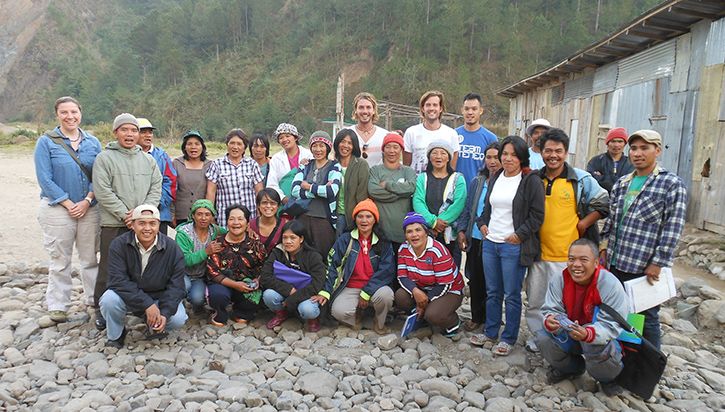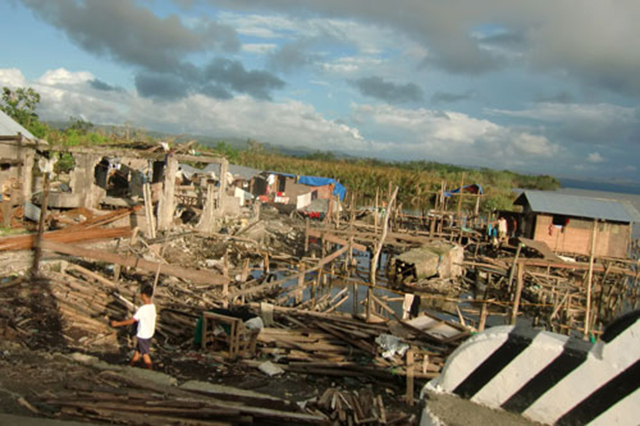Resilient Communities Grow to Help Others

On November 8, 2013, the strongest tropical cyclone ever recorded hit the central islands of the Philippines. The islands of Leyte and Samar were hit the hardest, with more than 6,000 dead and 1,000 missing. Southern cities like Tacloban and Surigao were devastated, with infrastructure damaged so severely that rescue and recovery seemed next to impossible.

But one thing was different about this response. Rather than preservative-heavy canned and processed foods, the distribution centers handed out healthy, organic biscuits and noodles, along with a high-energy powdered nutritional supplement that could be used to feed infants as well as kids and adults.
How did they do this? Where did these supplies come from?
Believe it or not, the answer begins at the highest levels of government – but perhaps not in the way you’d think!
The larger producers would be able to compete just fine, but in a country where 31% of workers (nearly 12 million people) are employed in agriculture, and where the average farm size is around two hectares (about three city blocks here in NYC), it is safe to say that most Filipino farms are small farms. In 2015, when the tariffs drop to zero and the market becomes flooded by inexpensive fruits and vegetables from China and other ASEAN countries, the outstanding question was: how would small farmers compete?
“The only hope for us is to grow organic, and purchase and make our own fertilizers,” he said. “Then we can lower the price and compete with the Chinese.”
Having solidified their work around an asset-based approach over the past few years, the development professionals in the Episcopal Church in the Philippines knew just what to do when they found their citizens facing a change in the agro-economic playing field. To begin, they launched an asset inventory to see what resources, expertise, markets, demands and opportunities already existed in the landscape.
Investigating further, E-CARE clued into an emerging trend in the Filipino market: organic certification. It is not that Filipino farmers were new to organic farming; indeed, many had been growing crops utilizing homemade organic inputs passed down through generations, like using coconut oil as an effective pesticide and banana vinegar to kill weeds. What was new was certification of organically grown produce and a growing market for chemical-free foods. In Manila, many shoppers were interested in purchasing organic fruits and vegetables, and the E-CARE folks saw an opportunity to not only level the ASEAN 2015 playing field, but to create a market that would honor locally-grown, organic produce.
Next, E-CARE started to consider whether they could expand their product line. Fruits and vegetables were good, but they needed products that had a longer shelf life. Soon, their community workers began training farmers and their families to process their produce into noodles, chips and biscuits (more like a cookie than a dinner roll). These products could last a bit longer and could handle the trip between the north and more southern parts of Luzon and the other islands.
In 2013, this market expansion was working, thanks to steadfast E-CARE training and follow-up, with funding and technical support from Episcopal Relief & Development. Farmers were adjusting their agricultural practices to fill all the requirements for organic certification, with great success. Families were processing noodles and other foods, and E-CARE was trucking the fresh and processed foods to market. Livelihoods were growing, enabling communities to invest in buildings and other infrastructure projects, and providing a source of household income. But they were also building something invisible, something that wouldn’t come to light until a national emergency called for all hands to help. In fact, they were building their own capacity to assist neighbors in a time of need, and transforming themselves from receivers to givers.
In the days following Yolanda’s impact, the Church considered how best to help in the face of overwhelming need. There was strong demand for immediate grants to rebuild homes, but they knew that a locally led, asset-based approach would produce more sustainable results. Floyd’s colleagues wrote in a report that, “…[initially] it seemed insensitive and inappropriate to talk about ABCD and the ‘receivers to givers’ scheme with communities whose livelihoods have been almost completely wiped out… [but] after serious thinking on the matter a decision was made to pursue the rehabilitation and development work only under the new approach.”
Now, one year later, the rebuilding continues and the groundwork is in place to move communities out of recovery into sustainable livelihoods. When the farmers in the North heard about the response to their products, they felt proud that they were able to help in a way that not only provided critical supplies, but also sent encouragement to their brothers and sisters in need. These feelings of pride, confidence, support and solidarity that helped make the agricultural programs in the North so successful will help the Yolanda-impacted communities build back so that they can thrive and care for others in the future.
—————————————
Sean McConnell is Director of Engagement for Episcopal Relief & Development.
Images: Top, destruction after Typhoon Haiyan; Middle 1 & 2, women leaders showing their organic farms, Middle 3, Inside an organic greenhouse; Middle 4, man preps high-energy nutritional paste; Middle 5, women shows a healthy noodle making station; Middle 6, organic produce at the market; Last, organic farmers in the Philippines.


